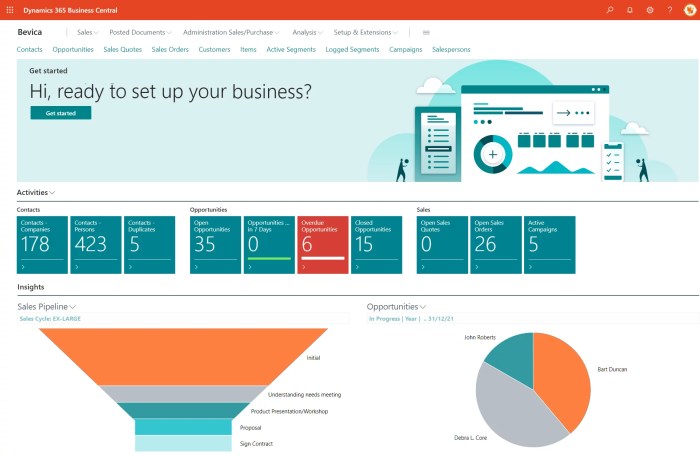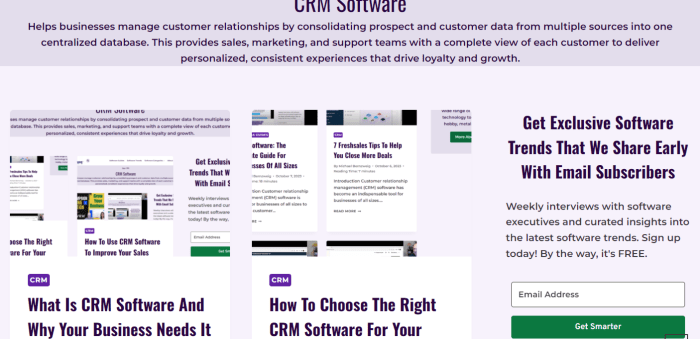Crm software for customer service – In today’s competitive landscape, providing exceptional customer service is paramount to business success. Customer Relationship Management (CRM) software has emerged as a crucial tool for businesses of all sizes, enabling them to streamline operations, improve customer interactions, and ultimately boost profitability. This comprehensive guide delves into the world of CRM software specifically for customer service, exploring its features, benefits, and considerations for implementation.

Source: bevica.com
Understanding the Role of CRM in Customer Service
A CRM system acts as a central hub for all customer-related information, providing a 360-degree view of each individual. This consolidated view allows customer service agents to access crucial details instantly, leading to faster resolution times and more personalized interactions. Gone are the days of searching through multiple databases and email threads; CRM streamlines this process, empowering agents to provide efficient and effective support.
Key Features of CRM for Customer Service, Crm software for customer service
- Ticketing System: A robust ticketing system allows for the organized management of customer inquiries, ensuring that no request falls through the cracks. Features like automated routing, prioritization, and status updates are essential for efficient ticket handling. This includes features like self-service portals and knowledge bases to empower customers to resolve issues independently.
- Customer Interaction History: Access to a complete history of customer interactions, including past tickets, calls, emails, and chat logs, allows agents to understand the customer’s context and provide tailored support. This historical data also helps identify recurring issues and areas for improvement.
- Live Chat and Messaging Integration: Many CRM systems integrate with live chat and messaging platforms, enabling real-time communication with customers. This provides immediate support and enhances customer satisfaction.
- Call Center Integration: For businesses with call centers, CRM integration streamlines call routing, call recording, and agent performance tracking. This improves call handling efficiency and provides valuable data for performance analysis.
- Knowledge Base and Self-Service Portal: A well-organized knowledge base allows customers to find answers to common questions independently, reducing the workload on customer service agents. A self-service portal further empowers customers by providing access to FAQs, troubleshooting guides, and other resources.
- Reporting and Analytics: Comprehensive reporting and analytics capabilities provide insights into customer service performance, allowing businesses to identify areas for improvement and measure the effectiveness of their strategies. Key metrics include average resolution time, customer satisfaction scores (CSAT), and Net Promoter Score (NPS).
- Automation and Workflow: Automating repetitive tasks such as email responses and ticket assignments frees up agents to focus on more complex issues and enhances overall efficiency. Workflow automation ensures that tickets are processed systematically and efficiently.
Benefits of Implementing CRM for Customer Service
The benefits of implementing a CRM system for customer service are numerous and impactful:
- Improved Customer Satisfaction: Faster response times, personalized interactions, and easy access to information lead to significantly higher customer satisfaction.
- Increased Efficiency and Productivity: Automation and streamlined workflows free up agents’ time, allowing them to handle a larger volume of inquiries efficiently.
- Reduced Operational Costs: Improved efficiency and reduced manual processes translate to lower operational costs.
- Better Agent Performance: CRM systems provide tools and data to monitor and improve agent performance, leading to increased productivity and skill development.
- Enhanced Customer Retention: Providing excellent customer service fosters loyalty and increases customer retention rates.
- Data-Driven Decision Making: The insights gained from CRM analytics allow businesses to make informed decisions about their customer service strategies.
- Improved First Contact Resolution (FCR): By providing agents with all the necessary information, CRM systems help achieve higher FCR rates, improving customer experience and efficiency.
Choosing the Right CRM Software for Your Business
Selecting the appropriate CRM software involves careful consideration of several factors:
- Business Size and Needs: The size of your business and the complexity of your customer service operations will influence your choice of CRM.
- Budget: CRM software comes in various price ranges, from affordable cloud-based solutions to more expensive enterprise-level systems.
- Integration Capabilities: Ensure the CRM integrates seamlessly with your existing systems, such as email, phone, and other business applications. Consider APIs and pre-built integrations for a smoother transition.
- Scalability: Choose a CRM that can scale with your business as it grows.
- User-Friendliness: The CRM should be intuitive and easy for your agents to use.
- Customer Support: Reliable customer support is crucial for a smooth implementation and ongoing maintenance.
Popular CRM Software Options for Customer Service
The market offers a wide array of CRM software solutions. Some popular options include Salesforce Service Cloud, Zendesk, HubSpot Service Hub, Freshdesk, and Zoho CRM. Each platform offers unique features and pricing models, making it crucial to research and compare options before making a decision.
Implementing and Managing Your CRM System
Successful CRM implementation requires careful planning and execution. Key steps include:
- Defining Your Goals: Clearly define your objectives for implementing the CRM system.
- Data Migration: Carefully plan and execute the migration of existing customer data into the new system.
- Training and Onboarding: Provide comprehensive training to your customer service agents on how to use the CRM effectively.
- Ongoing Monitoring and Optimization: Continuously monitor the system’s performance and make adjustments as needed.
Frequently Asked Questions (FAQ)
- Q: What is the cost of CRM software? A: The cost varies significantly depending on the features, vendor, and the number of users. Some offer tiered pricing, while others charge per user per month.
- Q: How long does it take to implement a CRM system? A: Implementation time varies depending on the complexity of the system and the size of your business. It can range from a few weeks to several months.
- Q: What are the key metrics to track in a CRM system? A: Key metrics include average resolution time, customer satisfaction (CSAT), Net Promoter Score (NPS), first contact resolution (FCR), and ticket volume.
- Q: Can a small business benefit from using CRM software? A: Absolutely! Even small businesses can benefit from improved organization, communication, and customer service. Many CRM systems offer affordable plans tailored for small businesses.
- Q: How do I choose the right CRM for my business? A: Consider your budget, business size, required features, integration needs, and scalability requirements. Research different options and compare features before making a decision.
Conclusion
Implementing a CRM system for customer service is a strategic investment that can significantly improve customer satisfaction, operational efficiency, and overall business profitability. By carefully considering your needs and selecting the right software, your business can leverage the power of CRM to deliver exceptional customer experiences and drive sustainable growth.
References
Call to Action
Ready to transform your customer service? Explore the leading CRM solutions today and discover how you can elevate your customer interactions and drive business success. Contact us to learn more about implementing a CRM strategy tailored to your specific needs.
Questions and Answers: Crm Software For Customer Service
What are the common types of CRM software?

Source: softwareoasis.com
Common types include cloud-based, on-premise, and open-source CRM systems, each offering varying levels of flexibility, scalability, and cost.
How much does CRM software typically cost?
Pricing varies greatly depending on the features, number of users, and vendor. Options range from free, basic plans to enterprise-level solutions with substantial monthly or annual fees.
What are the key features to look for in a CRM system?
Essential features include contact management, sales force automation, customer support ticketing, reporting and analytics, and integration with other business applications.
How long does it take to implement a CRM system?
Implementation timelines vary depending on the complexity of the system and the size of the organization. It can range from a few weeks to several months.
What is the return on investment (ROI) of CRM software?
ROI varies, but successful implementations often lead to improved customer satisfaction, increased sales, reduced operational costs, and enhanced employee productivity.
